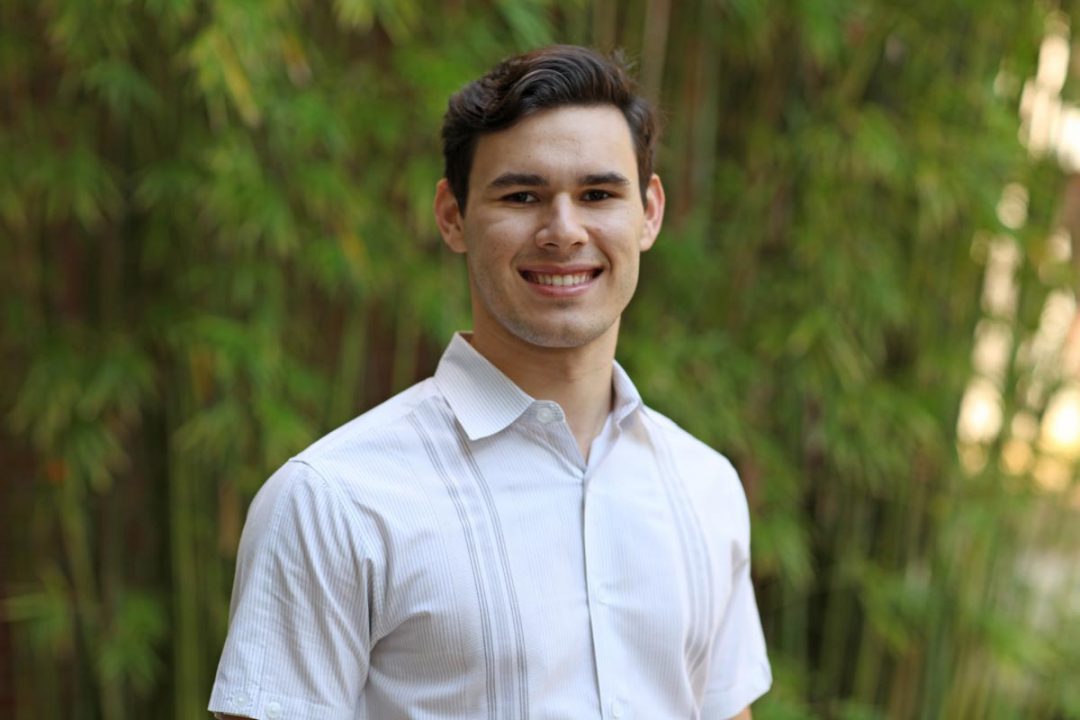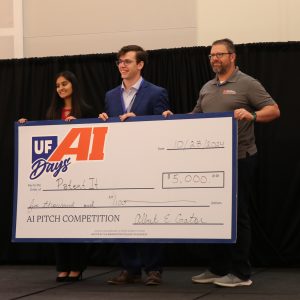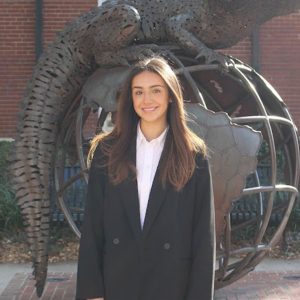Humanitarian mission will take Heavener student to Cuba
Chris Vázquez can’t help but imagine the moment…
He glances out an airplane window onto an island generations of Americans have never set foot upon. Soon, the plane’s door opens, and the Miami native is greeted with a warm, humid breeze that is equally familiar and completely foreign.
Vázquez has arrived in his family’s homeland, a place his relatives believed they would never see again—some because they couldn’t, while others swore never to return.
“I’ve pictured it several times,” Vázquez said. “It’s one of those things where you can think about it, but you don’t know how it’s going to be until it actually happens. I feel like it’s going to be a huge moment in my life.”
This summer, Vázquez, along with UF students Andy Garcia and Jazmin Rubido will travel to Cuba. The junior finance major is on a mission—a humanitarian mission funded by the Davis Foundation’s “Projects for Peace” —to empower Cuban farmers and modernize their processes to protect the environment.
The events that led Vázquez to this surreal moment are an incredible combination of diligent work, steadfast belief, and remarkably good timing.
The genesis of Vázquez’s mission began this past fall when he enrolled in Challenge 2050, a program sponsored by UF/IFAS (Institute of Food and Agricultural Sciences) designed to develop sustainable solutions when the world’s population is expected to surpass 9.6 billion in 2050. Vázquez met with Dr. Frederick Royce from UF’s Department of Agricultural and Biological Engineering and Dr. William Messina, Jr., from IFAS’s Food and Resource Economics Department to discuss agricultural innovations Vázquez could explore.
The professors told Vázquez about marabú, a bothersome and aggressive plant that enveloped more than 3.7 million acres of Cuban land as of 2012, according to a BBC report.
The pervasiveness of marabú is both a curse and a blessing. This rigid and thorny plant can grow five meters high and is difficult to remove, but the plant can be used to make charcoal, a major Cuban export. According to the Havana Times, Cuba’s largest vegetable coal producer exported 29,000 tons of coal and earned more than $10.5 million in profits in 2014.
Vázquez wrote his Challenge 2050 research paper on marabú in Cuba, and discovered the inefficient and environmentally harmful process used to transform the plant into charcoal.
“The process is done in pits, which doesn’t carbonize everything so there are harmful volatiles that escape,” Vázquez said. “They just don’t have the means; they’re using Soviet-era equipment.”
The solution, Vázquez said, is to provide the farmers with kilns—steel ovens where the carbonization can occur. Using kilns will reduce harmful emissions by 75 percent, Vázquez said.
The planning for this project, which will take place in Pinar del Rio—about 115 miles west of Havana— has been extensive, and has involved numerous international partners. Vázquez, Garcia and Rubido —members of InspireCuba, the UF student-run, non-profit and non-political organization—are coordinating efforts with the University of Havana, which has a cooperative agreement with UF IFAS. University representatives will assist with installing the kilns—which are being imported from the United Kingdom—and participate in a week-long workshop where Vázquez and his counterparts will instruct the farmers on how to operate them. The Cuban Association of Workers in Agriculture and Forestry will also offer support.
Assisting these agricultural entrepreneurs was not even a possibility until late last year when President Barack Obama restored diplomatic relations with Cuba, which the U.S. has had an embargo against since 1960. Although U.S. tourists are still banned from visiting Cuba, there are 12 exceptions—one of which is humanitarian projects—where Americans can legally visit the country.
“Two years ago, this wouldn’t have been possible,” Vázquez said. “That’s why during our presentation we stressed that the time was now to make a difference.”
Vázquez said his involvement with this project, which earned a $10,000 grant from the Davis Foundation, was a sensitive topic with his family.
“It’s a very emotional subject,” Vázquez said. “The older generation of Cubans who were persecuted is very much against going back. So even joining [InspireCuba] was a touchy thing for me. But this isn’t political; this is strictly about providing humanitarian aid to the Cuban people, and really making a difference for them. I’m very lucky that my family supports me because a lot of my friends could try to do the same thing and not be supported.”
In the team’s proposal, Vázquez wrote that the hope for its project is “to promote and advance the realization of peace for the Cuban people.” Vázquez said the first step toward peace begins with creating economic opportunity for them.
“We’re not going there to do anything politically; we’re not going to Americanize anything,” Vázquez said. “It’s about building trust with the Cuban people. It’s about opening the door and opening the channels and, hopefully, we’ll see a change. If I can go in and make a difference for even a small group of people, I’ll feel I accomplished something.”
DID YOU KNOW?
- Chris serves as President of InspireCuba.
- Chris’s next few months will be incredibly busy. After he returns from Cuba, he heads to New York for an internship at UBS Financial Services. He will return to Gainesville briefly, and then visit Italy for his study abroad experience.
- Chris said his experience at Warrington was vital to the project’s success. “From writing the proposal to way I came into the organization looking to make an impact, I think that business sense helped.”




